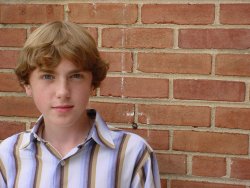It started when I was eight years old; my parents began
to act strangely around me, having countless conversations covertly or “behind
closed doors.” They hoped I was too
young to understand the situation or even get my head around the fact that
something was wrong. But I knew there
was, and I waited for months until they finally told me something that went
far beyond what I imagined I would be told: my father had been diagnosed
with a rare form of Stage Four Cancer.
I still remember how I felt at first; I was confused, but
I honestly had no idea how to feel. I
had suffered hardships before; my parents’ divorce was one of the periods
I remember witnessing vividly but not quite understanding as well. But this was different; I fully understood
the dangers of cancer and its effects; but I didn’t feel much. I was saddened, but to me it was a fact that
my father had cancer and that he had a very small chance of living; and there
was nothing at all I could do about it. While
I felt powerless at first, the numb feeling of being absolutely without any
control of anything was one to which I adapted. I accepted that when my dad was younger, he
smoked like many other people did at the time and that this was the cause
of his present situation. My approach
was a scientific and cold response to the feelings that I, and anyone else
in my situation, should have felt.
That’s why the main character of this story
is not me. I have never expected any sort of condolence
for my struggle; because for three
of five years of a war, I offered my support to my father but I, as I said,
attempted to destroy my sadness and move on. Although
I did experience some emotional struggles and many extremely harsh sights,
the true main characters of this story are, for me, the two most obvious:
my parents. My parents divorced when
I was three and, for most of the rest of my life, maintained a strong, but
awkward, relationship. They almost never talked except for when my dad was
picking me up, and when they did, the conversations were usually abrupt,
as if two strangers were talking.
That’s why I was surprised when the first
person to step in and help my father get through this struggle was my mother. My mother, for a long time, balanced two children,
a stressful job, and my dying father for over five years. She spent God knows how much time and money
getting my father to be treated at Georgetown Hospital by a team of world-renowned
doctors, some of whom are quite famous in the medical community. Of
course, all the resources and doctors would have been pointless if the hero
that is my father had not have been ready for what was to come over the next
five years. I honestly don’t know how he survived the physical
and emotional torture that must arise when going through the circumstances
into which he was forced. The chemotherapy,
the radiation therapy, the painkillers, and of course the feeling of waiting,
perhaps wanting, to die are just
some of the things he dealt with on a normal basis. Perhaps I never realized it until recently,
but I truly believe that this tragedy brought my family back together, and
created many philosophical epiphanies for myself, my mother, and undoubtedly
my father that would have never come about otherwise.
I can’t tell you how many times during my two years of maturity
during my father’s third cancer (by that point it had spread from his throat
to a lymph node and again to his lungs, one of which is ¾ surgically removed)
I learned something new about life – about how every six months, during my
father’s tumor checks, I’d be holding my breath, hoping that it would not
come back.
And it didn’t. My
father is now in good health. Despite everything he has been through, he
is active. He goes on 100 to 300-mile bike rides nearly every weekend, and
for the first time, I am able to truly marvel at how lucky I am and how lucky
we all are. The amount of variables
and factors that came together for my dad to survive simply amazes me to
this day; the bonding of the good, strong part of every human being and the
years of science and research that keep my father, and all of us, alive are
nothing to be taken for granted. And
even though the idea is old and has been clichéd in movies and books for
years, it is indeed true that out of every dire situation comes something
great, that perhaps all of us need to sit down and read The
Brothers Karamazov and put the idea of “through sorrow, find happiness” into
our own lives.


